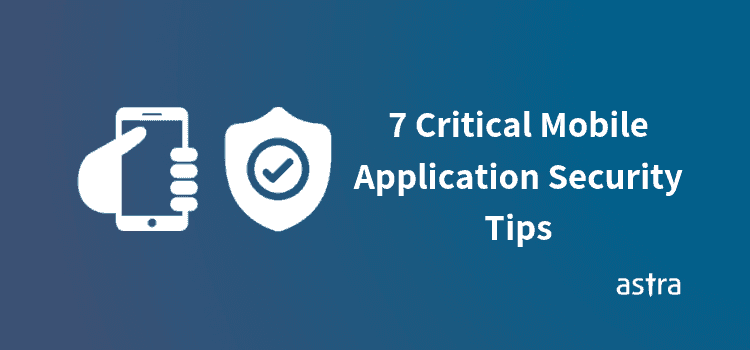Every day you carry your world in your pocket. Developed as a wireless telecommunication device the phone can now do practically anything. This has led to the rise of application developers left, right and centre. In spite of the cut-throat competition, the mobile application industry is booming and so are the threats. This article talks about the basic steps mobile developers can follow to ensure Mobile Application Security.
According to Google’s ex-chairman, Eric Schmidt,
Mobile use is growing faster than all of google’s internal predictions.
This speaks for itself. However, this success has also attracted malicious actors looking to make illegitimate gains by exploiting the vulnerabilities in mobile phone applications. This highlights the importance of cybersecurity in mobile applications. It is the need of the hour to create applications with the security of users in mind. So, let us begin with the 7 critical security tips you should ensure about your mobile application.
Test your software
Testing is one of the crucial steps in the development process of any product, including mobile applications. With any other stage in the mobile app development cycle, one can come again. But with a testing error, your app is nearly dead in the market.
What you should do?
Don’t rush with the testing. Your decision to release an unsecured application could come back to bite you in the future. Hire experts for penetration testing for mobile application protection. It will bring to light the weakness in a system or network. Thorough testing for authentication and authorization, data security and session management is recommended.
Right API security strategy

This step should not be overlooked because an Application Programming Interface (API) provides the easiest access point to hackers. APIs are responsible for controlling the flow of data between a number of different parties and hence selection of a suitable authorization technique is important.
What you should do?
There are three main security measures that comprise a well-built API security stack: identification, authentication, and authorization. Consult an OAuth security professional when building your own API or creating an app that’s based on an API to make sure you’ve covered rights management, authorization, authentication, and data security from all angles.

Secure coding practices
Five years ago, people were mesmerized by how mobile apps could transform their lives. Today they are scared by what the same apps can do to their privacy. Mobile Application Security is an important factor that separates top-notch applications from those that end up dying on the vine.
What you should do?
Make sure your code is secured before allowing third party access to your application. Limit their access to only the parts that are mandatory. This will minimize risks.
Conduct a vulnerability analysis. Check the app for countermeasures, for loopholes, the effectiveness of measures, etc before public release.

Secure back-end network connections
The backend is often used for data storage or communication. It generally consists of a server, an application, and a database. These servers can be yours or belong to any third party. Lack of back-end security on these connections can put your users at risk. Unsecured connections could prove to be an open door for attackers.

What you should do?
Protect your database with efficient mobile application security at all times. Set up a safe and secured back end network. Database encryption and encrypted connections with a VPN (Virtual Private Network), SSL (secure sockets layer), or TLS (transport layer security) add extra security. You can spread resources out across servers, so they’re not all in one place, and separate key resources from users, often with encryption measures.

Secure your app code
Native applications are different from web applications. In native applications, the user downloads the whole code on a local platform while for web apps most data exists on the server. The local code is more easily accessible to malicious actors.
What you should do?
Code security is also important. Encrypt your application. Don’t rely solely on app store approval as proof of app security. Conduct source code scanning

Separate servers for internal and external apps
In general, the organizations have two kinds of web apps – one serves the external user and the other one deals with the internal users. Both need to be kept safe from attackers. To reduce risks keep both apps on different servers. It is difficult to ensure the security of the user’s device where the app is downloaded.
What you should do?
Rooted and jail broken devices have their built-in security removed. Don’t allow download of application of such devices. This will save you from unwanted mobile attacks.
Think again of the ‘BYOD’ concept
Many organizations allow the “Bring Your Own Device” (BYOD) concept. In encouraging the employees to bring their own devices to work, they should be more careful. These practices open new doors to vulnerabilities and make it hard to monitor data access.
What You Should Do?
Mobile device management (MDM) products like Airwatch and MobileIron make it convenient for employees to work on the go and also keep a watch on data access.
Create secure connections by implementing VPN. Block unauthorized device access. Use firewall, anti-virus and anti-spam software to enable security on allowed devices.
Wrapping Up – Mobile Application Security
An application is as secure at the effort put into it. The list above states the basic measures that you can take to ensure mobile application security. Also, it should be mentioned here that even though these are the most critical tips, this list is not exhaustive. The best you can do is keep yourself updated with the latest security measures and keep your eyes and ears open for vulnerabilities.
















